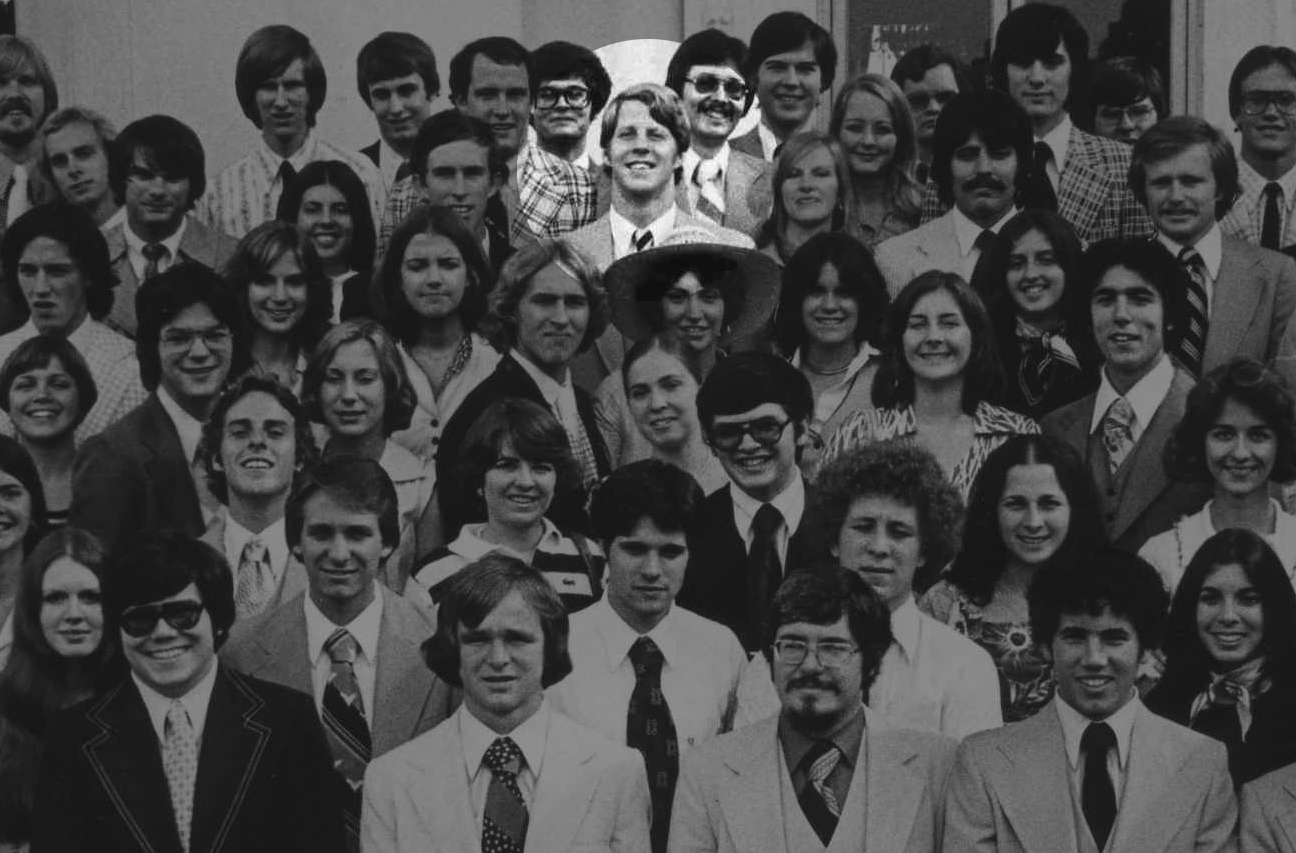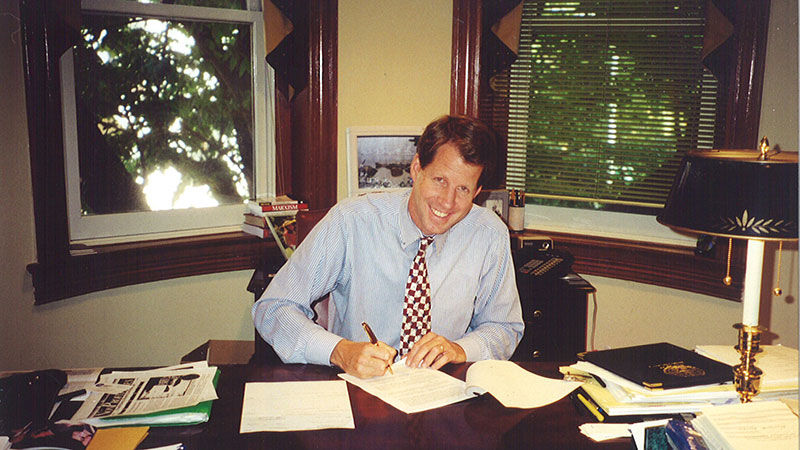
This month we celebrate President Roger Ream’s 20th anniversary with TFAS. Ream first came to TFAS in 1976 as a student in the Engalitcheff Institute on Political and Economic Systems following his junior year at Vanderbilt University. Ream was recruited to the program by then-TFAS President David Jones. The two were introduced by a classmate of Ream’s, David Boaz, now of the Cato Institute. The introduction proved to be a pivotal one for Ream as he would later be recruited a second time by Jones, to become the executive vice president of TFAS in 1991.
Ream landed his first post-college job with Rep. Phil Crane (Ill.), whom he had interned for while a student at TFAS. For two years, Ream assisted Crane with logistics as he traveled throughout the country, testing the waters for a presidential bid. In 1979, Ream moved to Irvington, N.Y. where he took a job with the Foundation for Economic Education (FEE) as its director of seminars. There he worked with renowned FEE founder Leonard Read. Ream returned to Washington in 1982 to serve on the staff of Rep. Ron Paul (Texas). He worked on budget and tax issues, oversaw the work of Paul’s Foundation for Rational Economic and Education (FREE) and hosted his cable TV program, interviewing a host of prominent free-market economists, including Murray Rothbard and Walter Williams. Ream then joined Richard Fink as he was founding Citizens for a Sound Economy in 1984, which later became Americans for Prosperity. In 1991, Ream was approached by David Jones to join the TFAS staff.
In honor of Ream’s 20 years with TFAS, we decided to turn the microphone over to him for a Q & A, to learn about his experiences, from student to president, with The Fund for American Studies.
Q: What do you remember about your experience at ICPES in 1976?
A: It was marvelous. I was in Washington the year of America’s bicentennial. We had two classes, comparative economic systems and comparative political systems, both of which offered a survey of political and economic systems throughout the world. We heard from remarkable speakers, including Walter Judd, Jack Kemp and Admiral John McCain (the senator’s father). I made lifelong friends with classmates, among them Mark Stansberry, now a TFAS trustee, and Mark Levin, a TFAS regent. My internship with Rep. Phil Crane was also quite valuable and led to my first job out of college – trying to help him launch a presidential bid.
Q: When you returned to TFAS in 1991, did you expect to stay this long?
A: I remember talking to an older colleague when I was considering joining TFAS, and he advised me not to get a reputation as a “job hopper.” I dismissed the advice at the time, but in hindsight, I don’t think he needed to worry – I’ve been here for 20 years! The opportunity to work with David Jones and the board of TFAS was an exciting one. TFAS had just received a generous bequest from the estate of John and Virginia Engalitcheff in the amount of $14 million. The mission was educational, and I’d come to conclude that real change begins in the classroom – not in the halls of Congress or at the White House. What I didn’t expect was the extent of our involvement with international programs – a direct response to the glorious changes occurring in Berlin and throughout Central and Eastern Europe at the time.
Q: How has TFAS changed during your tenure here?
A: In 1991, we had four fulltime and two part-time staff members. Our annual budget was under $1 million. We were financially strong but small. We had just started our third summer Institute and had total enrollment of about 200 students. Today, we have 11 distinct summer and semester-long programs, an annual budget of close to $8 million, 25 fulltime staff members and a faculty of nearly 30. Enrollment has increased dramatically – close to 1000 students annually. Plus, we have a range of shorter seminars and an extensive alumni outreach program. Of course, the credit is shared with the staff, our board, Chairman Randy Teague and our supporters.
Q: What have been some of your biggest accomplishments at TFAS?
A: We are reaching more students with more programs. We are not “just a summer program,” as one person described us years ago. We now have students with us for the fall and spring semesters, and we also reach students in law school and other career areas. I’m also proud of the work we do internationally. There are very few organizations like us that are trying to reach young people in other parts of the world to teach them the ideas of limited government, the rule of law and free markets. I’m also very pleased that we don’t limit our programs only to those students who share our perspective on economics or the role of government. We prefer to take a comparative approach in many of our courses and to present students with concepts they often have never heard before. In my mind, this makes TFAS unique. It’s important, given the climate on most college campuses, to expose students to other types of ideas, to challenge them to think critically.
Q: How does working for TFAS differ from the typical D.C. career?
A: This is a very political town. It’s hard for politics not to infuse things that go on here, but we have tried very hard to maintain an educational approach to what we do and not get caught up in the day-to-day partisanship and politics of Washington. We have a long-term focus in the sense of investing in students who will be making a difference for the next 4-5 decades, rather than simply trying to sway the outcome of the next election.
Q: What do you appreciate most about TFAS?
A: Lots, but our outstanding faculty is one thing. Our professors have a passion for teaching; otherwise they wouldn’t give up their summers to enjoy Washington’s wonderful humidity. Our staff is also passionate about our mission. They don’t come to work each day simply to earn a living, but to make a difference in the world.
Q: Why is the work of TFAS so important?
A: The importance is demonstrated in the surveys of civic and economic literacy. It’s unfortunate that K-12 education and education at the university level aren’t adequately preparing young people for citizenship in a free society. Most students do not understand how our free-enterprise system operates and what is necessary to encourage entrepreneurship and opportunity. To insure that our prosperity is maintained for future generations, I think it’s vital for young people who are going to work in fields such as journalism, public service, public policy and other influential professions to have a good grounding in what makes America unique – our founding principles and free-market economics.
Q: How do you hope to see TFAS grow?
A: Right now we are developing programs that will enable us to reach many more students in the U.S. and overseas. We are working to identify more ways to utilize technology, including online education, webcasts and webinars, YouTube, Twitter and other methods so that we can reach more students than we can accommodate in our summer and semester programs. The list is really endless. We won’t rest until every student who wants to attend one of our programs and learn about liberty can do so.

